The 2018 cultural moment: The Kavanaugh hearing TV spectacle laid bare the country’s deep divisions
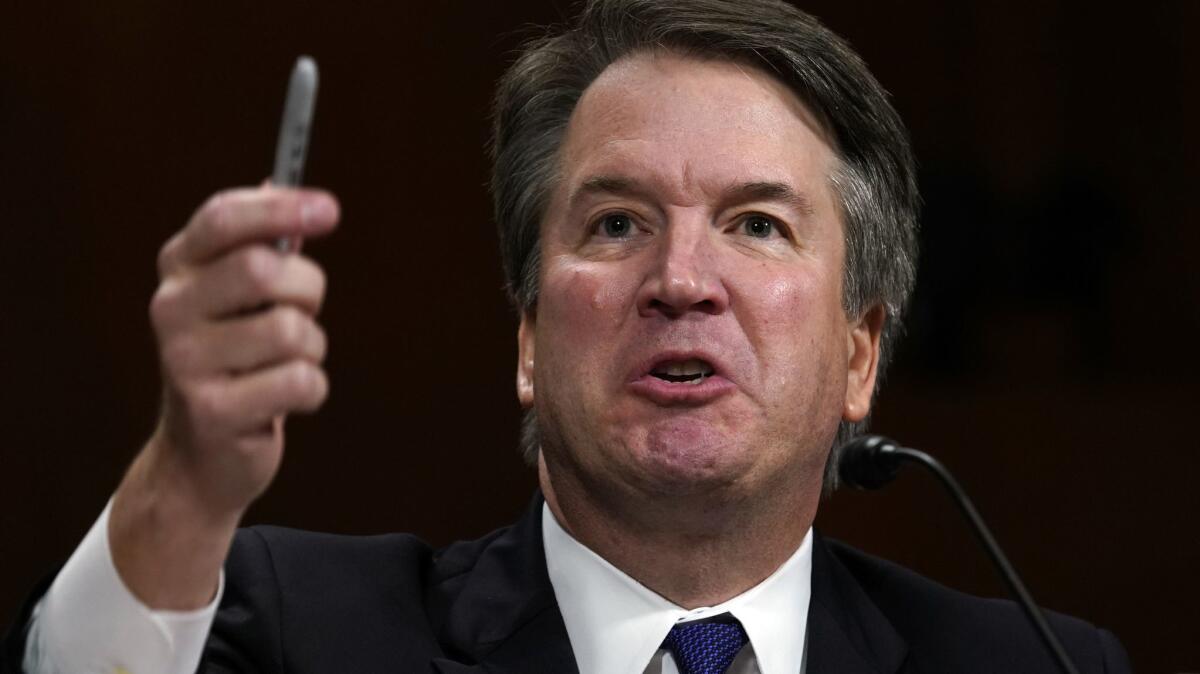
- Share via
On a rainy day in a Senate chamber, they swore their oaths and did battle: she of the blue-suit and measured voice; he of the tears, rage and denial. It was epic and sad. It seemed a fiction, but it gleamed in real time, a grand, messy entertainment, like a spectacle in the Colosseum of ancient Rome, but one fit to the fury of our age.
That day — Sept. 27, 2018 — Brett Kavanaugh and Christine Blasey Ford held a nation rapt. Their star testimonies, and the scheming and conniving of bit players and opportunists, were a mesmerizing, sordid saga for a country that had slid into a caricature of itself. They were the avatars of our divisions, symbols of our political intransigence and injustices. They were a man and a woman in a post #MeToo era of righteousness and recrimination.
It was an American drama in two seesawing acts. We couldn’t turn away. We learned about her one-piece bathing suit and his hand over her mouth. We heard her say, “The boy who sexually assaulted me.” We listened to him deny, categorically. We got to know about P.J., Bernie and Squi and those little scribbles in a long-ago calendar. And then the supporting cast wheedled in: Sen. Lindsey Graham (R-S.C.) in a tirade worthy of Paddy Chayefsky’s “Network” and Sen. Cory Booker (D-N.J.) reveling in a “Spartacus” moment.
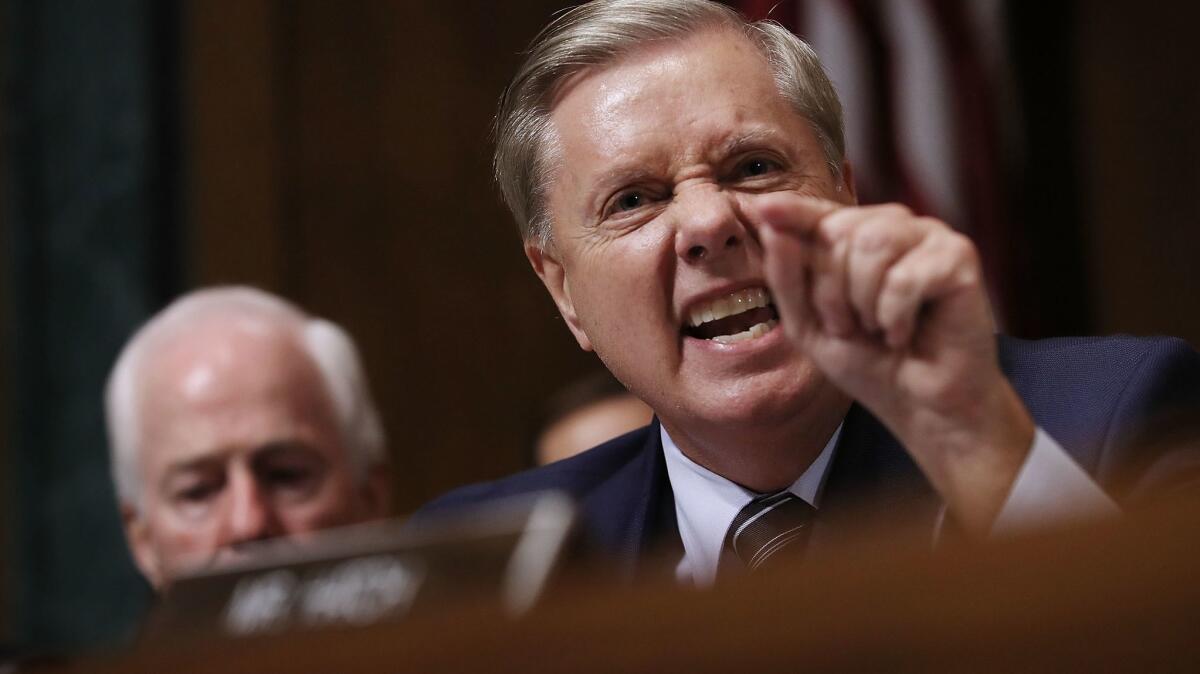
Imagine what Shakespeare or Virginia Woolf, to say nothing of Oliver Stone or Aaron Sorkin, would have made of a morality play watched by more than 20 million people, about 11 million of them on cable. Like the best stories, the Kavanaugh hearings mirrored our fears and flaws, our politics and pettiness and, more important, what we have become. America in the era of President Trump is a Netflix series with no off button, a rolling, roiling narrative of a land sheared of decorum and bristling with Deep State conspiracies and unbridled cynicism.
The rancor is stoked daily by Twitter and TV. Trump’s missives on Russia, Robert Mueller, Stormy Daniels, Michael Cohen, trade wars and whatever else strikes him in the wee hours has sent the information age into incalculable hyper-drive. His presidency has revealed the dangers to truth and the dark side of Facebook. But the former reality TV star has been a blessing to cable news. The conservative Fox News remains the most watched cable network, and this year its liberal scourge MSNBC saw its audience jump to a network record of 1.8 million prime-time viewers, ahead of CNN.
Reminiscent of the moon landing, the first Kennedy-Nixon debate and the Vietnam War, the Kavanaugh hearings were a startling TV moment, even for a nation that increasingly examines its soul through a lens and across countless screens. But our 24/7 news cycles and our Instagram stories make these glimpses fleeting; we devour what streams toward us more than we reflect on the consequences.
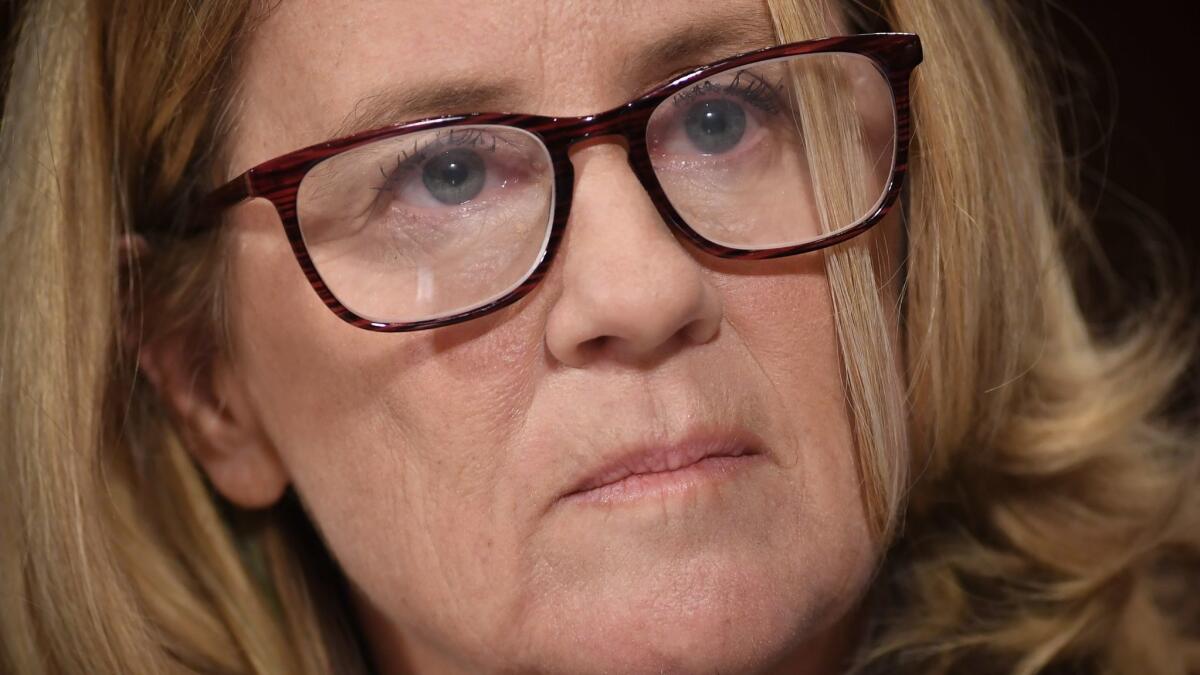
Kavanaugh called the hearings a “circus.” One wonders if P.T. Barnum would have blushed in envy or shame. What made it more infuriating, like a whodunit left unresolved, was that we never really knew what happened with two teenagers on that Maryland night in 1982. There was no smoking gun, only accusations, fallible recollections and denials. A man was being nominated for the highest court in the land, yet there was no scent of jurisprudence, no sliver of sober deliberation.
Instead, two adults were turned into poster children for causes in a show that became a brief, searing addiction.
The fallout from that hearing — the Senate days later made Kavanaugh a Supreme Court justice — resounded through last month’s midterm elections. Many Democrats and Republicans, progressives and ultra-conservatives, are pushing further the boundaries of their extremes. From the grit of mill towns to the affluence on the coasts, the nation is unsettled, seeking escape in “Saturday Night Live” satire or, if you’re a certain type of conservative, Sean Hannity’s blow-dried screeds.
We’ve been here before. Sort of.
Sen. Joe McCarthy’s hearings into alleged communist sympathizers in the 1950s were a dangerous mix of political grandstanding and farce. The Watergate hearings in the 1970s gave us heroes and villains and a taste of President Richard M. Nixon’s paranoia. Washington on teetered at the edge of constitutional crisis; secret tapes were played and those at the center of power were revealed as liars and charlatans. The country was torn, but the facts, spilling out across TVs, were known. The president resigned, boarded a helicopter and flew away.
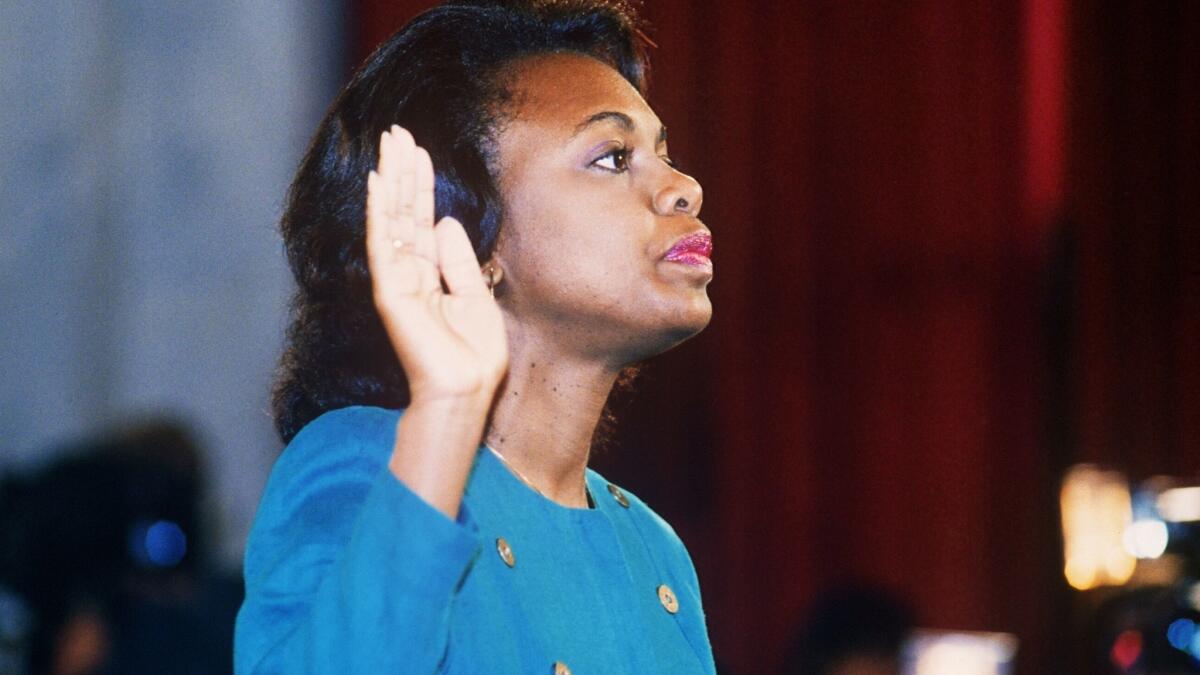
The Senate Judiciary hearings on Clarence Thomas’ 1991 nomination to the Supreme Court were a scorching glimpse into racism and sexism. Where Kavanaugh and Blasey Ford were white, Thomas and his accuser, Anita Hill, were black. Their testimonies aggravated the deepest wounds in American history, leading Thomas, who Hill said had sexually harassed her, to tell a TV audience of 20 million and the white senators on the dais before him: “I will not provide the rope for my own lynching.”
Thomas — his rage more restrained and focused than Kavanaugh’s emotional outbursts — was confirmed to the court. Hill, like Blasey Ford, left the Senate chamber as if a figure out of a Nathaniel Hawthorne novel, a woman whose quiet courage was not convincing enough to move the powers, mostly men, in her favor.
A lot, and not so much, has changed since Hill. Sexual allegations against Harvey Weinstein and Bill Cosby spurred the #MeToo movement. Sen. Jeff Flake (R-Ariz.) felt that wrath when he was shamed in an elevator during a break in the Kavanaugh hearings by women demanding to be heard. It was visceral, a metaphor for men, such as disgraced former CBS chief executive Les Moonves, who no longer had a place to hide. It wasn’t enough to deny Kavanaugh his bid. But in that televised instant and in a string of others one could feel the momentum shifting across the country.
Best of 2018: A look back at the year in movies, TV, music and more »
A record number of women ran weeks later for congressional seats. Some won in pivotal races, including in Virginia’s 7th, south of Washington, where a Democrat defeated a Tea Party incumbent. It had the aura of a reckoning or at least the beginning of a national debate in which the voices and the issues are changing. Kavanaugh and Blasey Ford personified that conversation and the divisions that play out across an unforgiving media spectrum.
Their ordeal in the tick-tock bright lights of a watching nation bettered anything Hollywood dreamed up this year. After Blasey Ford’s morning session, there was a sense, even among Trump and Fox News’ talking heads, that she had landed a fatal blow. She was credible, reserved, haunted by the resurrection of a long-ago night. She left hearing room, disappeared down a corridor. The pundits prattled.
But those passions, as if a strange rip tide, swept the other way in the afternoon. Kavanaugh brought his armor and his anger, his fight for his reputation. He denied all. Attacked all comers. His opponents saw him as petulant and insincere; his supporters as a brave, scrappy man out to save his honor from a troubled woman, a left-wing conspiracy and the wily designs of the Clintons. He sounded like the man who nominated him: President Trump.
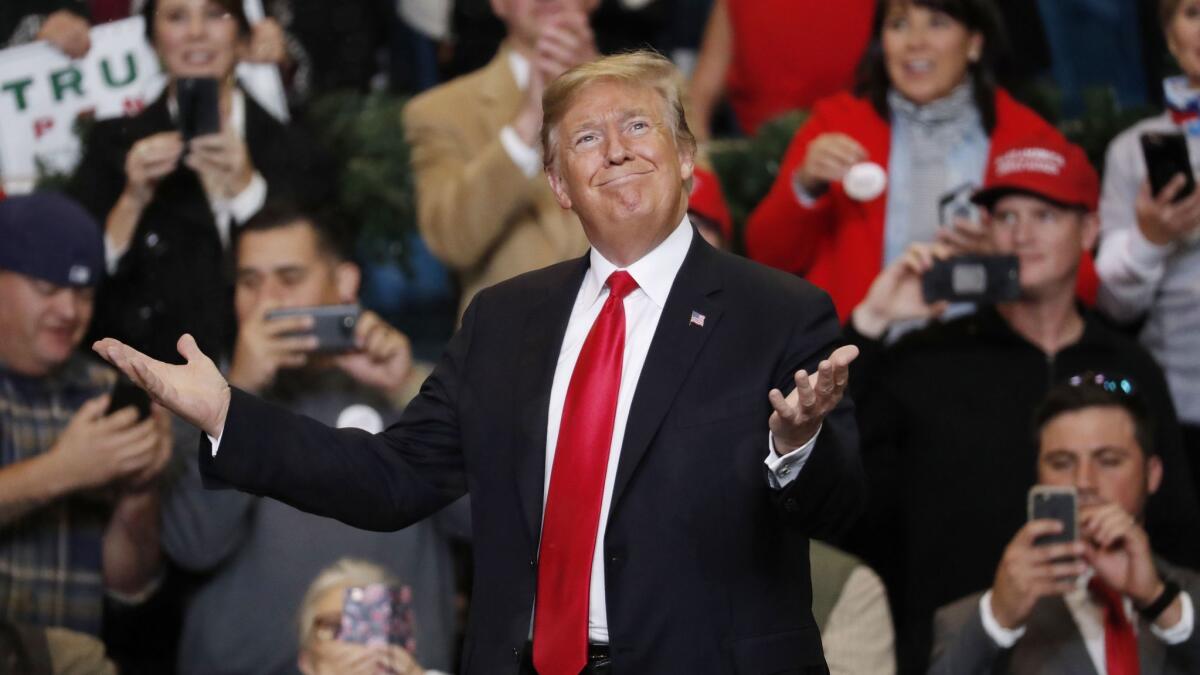
Never wanting to be out of the camera shot or too far from center stage, the president made it about him. He mocked Blasey Ford at a rally in Pennsylvania. He then said that his intervention helped Kavanaugh prevail. When pressed by Leslie Stahl of “60 Minutes” about why he ridiculed Blasey Ford, the president, for whom Nielsen ratings are as important as electoral polls, said, “You know what, I’m not going to get into it because we won. It doesn’t matter. We won.”
The remark laid bare the politics of the nation. But about the same time something was changing, like an unexpected gust. Trump’s rallies were attracting fewer TV viewers. Politico reported that Fox News’ coverage of a Trump rally in August in Indiana drew 2.5 million viewers. A year earlier, the president was playing to about 4 million viewers on the network. By October, Fox and other outlets stopped carrying the rallies live.
Trump was starting to sound like a re-run.
MORE ON 2018’s POLITICAL MEDIA MOMENTS
She said/he bellowed: The optics of the Ford/Kavanaugh hearings were as divided as America
Bill Cosby in handcuffs, Brett Kavanaugh questioned: Why this is more than a #MeToo moment
Why the ‘P’ word — propaganda — might be best for what we’re seeing on our TV screens
Watching Fox Nation, conservatives’ Netflix: Will MAGA viewers pay for the rage they get for free?
ALSO
Is it curtains for Hollywood’s bail bondsmen and bounty hunters?
See the most-read stories this hour »
Twitter: @JeffreyLAT
More to Read
The biggest entertainment stories
Get our big stories about Hollywood, film, television, music, arts, culture and more right in your inbox as soon as they publish.
You may occasionally receive promotional content from the Los Angeles Times.











